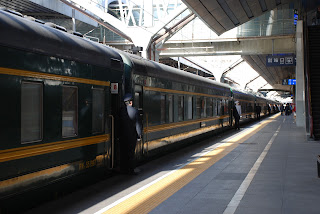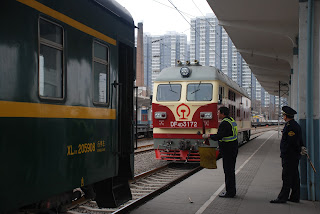 |
| Our train, K3, is the weekly through train from Beijing to Moscow via Ulaanbaatar. The destination board in Chinese, Mongolian and Russian is seen on the side of the Chinese coach. |
 |
| A DF4 loco backs onto an adjacent train |
 |
| Carriage attendants greet passengers as they join the train |
It is a reasonably early start to get to Beijing station
an hour before our train at 08:05. A short hop on the efficient but always busy
subway system provides the transport. The main station at Beijing follows the
format that is now familiar- having proceeded through the security check our
train, K3 to Moscow, is located on the departure board and we make our way as
indicated to waiting room 2.
 |
| A DF11 double unit diesel locomotive arrives from Harbin |
We are allowed down to the platform 30 minutes in advance
of departure which gives ample time for me to locate my birth, deposit my heavy
bag and grab some pictures. Our train is, to my surprise, headed by an electric
loco. Each of the green Chinese coaches is prepared for its passengers with the
coach attendants standing attentively at the doors. Elsewhere on the station
there is plenty of activity- a rather nice looking diesel loco is backing onto
coaches in the adjacent platform and a high speed Shinkansen style train also arrives into the terminus. Finally a
loud double-unit diesel pulls in with an arrival from Harbin before the doors
close on our coaches and one of the world’s great railway journeys can really begin.
 |
A freight train heads towards Beijing on the other side of
the valley
|
The train quickly gains speed as we pass Beijing South
Station where we previously arrived by high speed train a few days earlier.
Almost as quickly I am asked by the carriage attendant to shut the window
through which I have been looking. Once we have cleared the city limits the
landscape quickly and dramatically changes. The train climbs up into the
mountains and the double track splits into two single lines which plunge into
tunnels and soar over viaducts staying as close to the valley sides as
possible. In places the available space is so little that each of the two lines
takes up position on opposite sides of the valley. The landscape here is far
more dramatic than I was expecting and the first few hours of the trip fly by
as I am glued to the view from my compartment window- helped by the sunshine of
course!
 |
| Snaking through the mountains north of Beijing with our electric loco |
Our carriage attendant appears brandishing lunch and
dinner vouchers- another surprise as I am quite sure the train was booked
‘without services’. Not being ones to grumble we consign ourselves to the fact
that we may have slightly overstocked on ‘just add hot water’ noodles. I am
sure that they will come in handy later on. Eleven o’clock arrives and it is
time for our sitting in the dining car for lunch. My friend Simon introduces me
to some of the people he has met while I have been too busy admiring the view.
We sit down at a table with a Dutch couple and soon discover we are not the
only ones to be surprised at the provision of complimentary food.
 |
| The Chinese dining car |
The train food is a pleasant surprise- a typical dish of
Chinese celery with chicken and pepper to follow. The dining car also sells
some very reasonably priced drinks including beer and wine. As the train is not
very busy today we are allowed to remain in the dining car a little longer than
our allocated 30 minute sitting. There are many westerners on the train and we
use this time to swap stories about our travels with our fellow passengers. The
train has a very relaxed and friendly atmosphere.
 |
| We say goodbye to our SS3 locomotive at Da Tong |
By the time we have retreated back to our cabin it is not
long until our second stop of the journey at Da Tong. This is the first time we
are allowed to disembark from the train, some six hours after having left
Beijing. It is also at Da Tong that that our first loco swap takes place- the
SS3 electric locomotive giving way to diesel power in the form of a very
attractive DF4 loco (which has a very loud horn!). I take some photographs of
the operation which seems to bemuse the platform staff. One man watches very
closely over me as I take a picture, but having inspected it he seems to decide
that it is OK. Having tried several doors which have already been locked I find
my way back onto the train and await our departure.
 |
| The new order. Our DF4 diesel locomotive couples to the train for the journey onward to the Chinese- Mongolian border. |
The next two hours are whiled away quite pleasantly. The
landscape has now become less severe, our train seeming to traverse a desert
plateau bordered by distant hills on either side. We join some friends we made
earlier in the dining car in their compartment at the front of the train. Two
American ladies and two younger travellers from Australia are berthed here as
part of an ‘Intrepid’ tour group with an itinerary which turns out to be very
similar to ours. We swap stories of our
trips so far, our plans and aspirations while indulging in a selection of
Chinese snacks which the American lady has purchased for the trip- all of them
look a tad suspicious, but all seem to taste better once they have been dunked
in peanut butter! Content with our indulgences it is soon time to start
thinking about more food- back in the dining car for dinner. Less of a Chinese
affair than lunch, the meat and potato is still accompanied by rice. We also
bring our own Chinese wine (of varying quality) to the table. With discussion
and wine flowing it is with regret that we are told we must return from the
dining car.
 |
| On leaving Da Tong we pass a DF7 loco on a freight train |
I join my friend who has found a group of Dutch
travellers, and some beer, further up the train. Like many on the train their
ultimate destination after completing the Trans-Mongolian route is St
Petersburg- a destination which will evade us on this trip.
 |
| Our final sunset in China viewed from the train compartment |
As we watch a beautiful sunset over the desert the
train continues towards our final stop in China- the border town of Erlian.

No comments:
Post a Comment